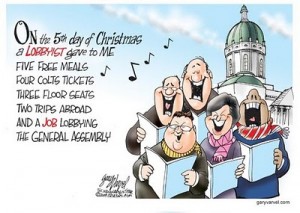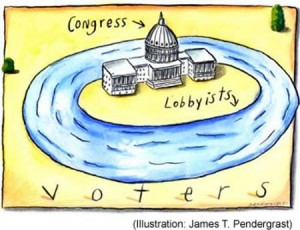Over $629 million in Super PAC (Political Action Committee) spending didn’t sway U.S. voters as significantly as expected in this past election, but in the coming months will the billions spent in corporate lobbying sway Congress?
Lobbying is a multi-billion dollar industry. While it’s technically true that any constituent can go lobby or try to persuade their legislators, the vast majority of lobbying that is happening in our capitals is funded by -and promotes- corporate interests.
Tens of thousands of corporate lobbyists call the DC area home. Since 2008, Wall Street has spent over $2.2 billion on lobbying, largely in order to weaken and squirm out of financial regulations. Add in the pharmaceutical, HMO, agribusiness, business, oil & energy, and defense/militarism sectors and we’re talking nearly $4 billion since 2011 spent specifically to get corporations unprecedented (and undue) influence over all those folks we just elected into office.
In this year’s election, nearly $6 billion was spent to influence the 120 million votes of the American electorate. Compare that to the $2 billion spent lobbying by the top corporate sectors this year to influence a handful of decision-makers. No matter who gets into office, once the elections are over, corporations spend billions to influence the victor. While the corporate elite gave well-financed electioneering an old college try, now these interests will be lobbying harder than ever to influence the decisions of around 750 hundred key decision-makers (Congress, presidential administrators, and state and federal offices like the EPA, SEC and FDA) to get what they want directly from the people who can give it to them. If you were a greedy businessman, what would you do?
 Sheldon Adelson may be lamenting, “I spent $60 million and all I got were these lousy House seats.” But now Adelson can just reroute money into lobbying, pay someone in a suit seven figures to put his feet up on the desk of a Congressperson, and still get a lot of what he wants, or at least less of what he doesn’t.
Sheldon Adelson may be lamenting, “I spent $60 million and all I got were these lousy House seats.” But now Adelson can just reroute money into lobbying, pay someone in a suit seven figures to put his feet up on the desk of a Congressperson, and still get a lot of what he wants, or at least less of what he doesn’t.
I don’t get to put my feet up on my Congressperson’s desk. I mean, I could try, but I would probably get in trouble. So why don’t lobbyists? They don’t deserve the proximity of influence and mental bandwidth of our elected leaders that their corporate-funded tactics afford them. Besides, these lobbyists usually aren’t even members of the constituencies that decision-makers were elected to represent!
Corporations are not people, and money is not speech. But the speech of people hired by corporations to do their bidding in Washington needs to be reined in. On the heels of an historical election and shifting political paradigm, we must be prepared in our civic activism to challenge corporate power plays beyond those unleashed by the Citizens United ruling. We must be vigilant in challenging the undue influence of corporate lobbyists. The voters and constituencies who just cleaned out DC expect integrity, and this means that legislators need to say NO to corporate lobbyists spoon-feeding them profit prioritizing policy and analysis… that’s not who they are elected to represent.
Voting truly does matter, but a healthy democracy requires ongoing participation.
If you want to take action to protect democracy now that the election has concluded, consider looking into Global Exchange’s Elect Democracy campaign and follow @ElectDemocracy and @GlobalExchange on Twitter.
See for yourself how much campaign money the last Congress received from Wall Street and their “Wall Street Loyalty Rate” based on how often their votes matched Wall Street’s lobby position. Most importantly, call your Congressperson and remind them that their job is to represent you, not lobbyists, in Congress.
Fact Sources:
- SuperPACs spent $629 million: MapLight.org
- Election cost $4.2 billion: Center for Responsive Politics: OpenSecrets.org
- Lobbying costs: Center for Responsive Politics for a) $2.2 billion Wall Street in 2012, and b) $4 for top sector lobbying (opensecrets.org)
 TAKE ACTION:
TAKE ACTION:
- Make the Call! Call your Congressperson and remind them that their job is to represent you, not lobbyists, in Congress.
- Leave a comment with your ideas about how to challenge the undue influence that corporate lobbyists have in DC.

